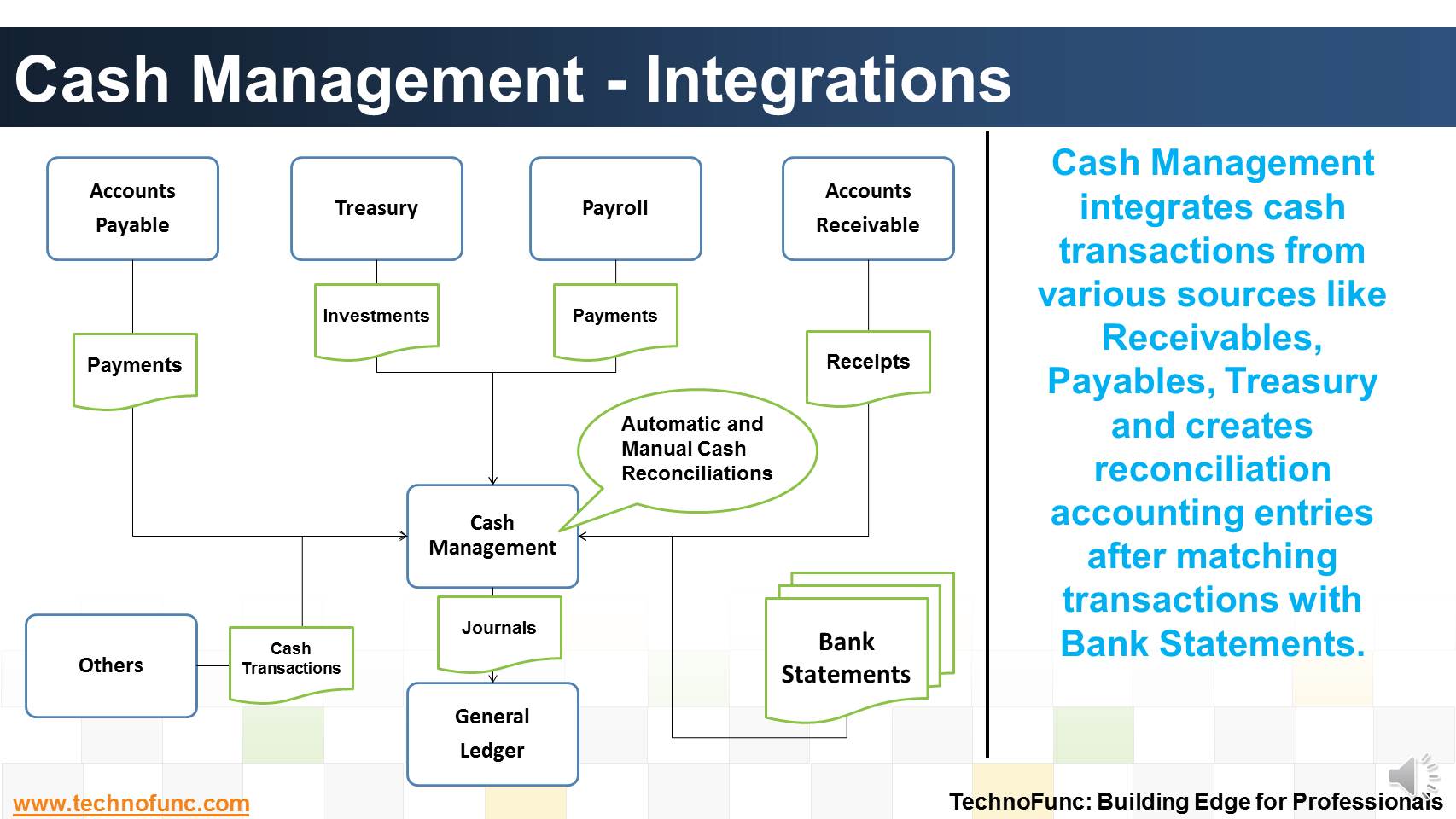- Home
- Business Processes
- Industry Knowledge
- Aerospace Industry
- Automotive Industry
- Banking Domain
- BFSI Industry
- Consumer/ FMCG Industry
- Chemicals Industry
- Engineering & Construction
- Energy Industry
- Education Domain
- Finance Domain
- Hospitality Domain
- Healthcare Industry
- Insurance Domain
- Retail Industry
- Travel and Tourism Domain
- Telecom Industry
- Leadership Skills
- eLearning
- Home
- Business Processes
- Cash Management
- Cash Management - Integrations
Cash Management - Integrations
Cash Management integrates cash transactions from various sources like Receivables, Payables, Treasury and creates reconciliation accounting entries after matching transactions with Bank Statements.
Cash Management receives payment information from Accounts Payables and you can then clear and reconcile payments. You can also create miscellaneous non-invoiced transactions, such as bank charges, debits, or credits.
Similarly, Cash management gets receipt information from Accounts Receivables. Using Cash Management, you can clear and reconcile receipts and create miscellaneous (non-invoiced) transactions, such as interest, debits, or credits.
Similarly, Cash management gets investment and deal information from Treasury. Using Cash Management, you can clear and reconcile investments.
You can get cash transactions from other sources like payroll or intercompany system.
Transactions are cleared and reconciled against a bank statement; reconciliation accounting entries are created after matching transactions and sent to General Ledger.
One of the most recurring theme in global transaction banking is the increasing integration of cash management and trade finance products.
This is possible only if the organization has a well defined Centralized Treasury Management System. This brings tangible benefits to both corporates and financial institutions.
To Learn more about how treasury and cash management integration can benefit organizations, please see our video on Treasury Management Process.

Related Links
You May Also Like
-
Many different accounts are used in finance. Understand the representation and nature of clearing account in context of accounting, finance and ERP Systems.
-
The objective of funding Management is to implement strategies that lead to the best borrowing rates and lower investment costs. Learn how treasury aids in loans and investment management functions.
-
The objective of Financial risk management is to protect assets and cash flows from any risk. Treasury function works to accurately assess financial risks by identifying financial exposures including foreign exchange, interest rate, credit, commodity and other enterprise risks. Learn about the various risks that are managed by treasury.
-
Introduction to Bank Reconciliation Process
These set of articles provide a brief introduction to Bank Reconciliation Process. This topic not only discusses the meaning of bank reconciliation process but also discusses how this process in handled in new age ERPs and Automated Reconciliation Systems.
-
What are the various sources of cash in an organization. Which sources increase the cash available with the enterprise and which sources results in outflow of the cash? Let us explore!
-
Although there is no straight forward answer to the question, how to best organize a treasury function, this article provides an generic view of the way large MNCs creates departments or sub-functions within the treasury function.
-
The terms Treasury Management and Cash Management are sometimes used interchangeably, while, in fact, the scope of treasury management is larger and includes funding and investment activities as well. Learn all about Treasury Management here!
-
Complete Bank Reconciliation Process
Bank Reconciliation Process is a eight step process starting from uploading the Bank Statement to finally posting the entries in General Ledger. Learn the Eight Steps in Detail!
-
Technology has enabled the treasury function by providing various solutions to manage it's complicated tasks. This article explains various types of treasury management systems available in the market.
-
Effectively using cash management with trade finance products brings tangible benefits to both corporates and financial institutions.Learn the various benefits of cash management process.
Explore Our Free Training Articles or
Sign Up to Start With Our eLearning Courses

About Us
Learning
© 2023 TechnoFunc, All Rights Reserved











